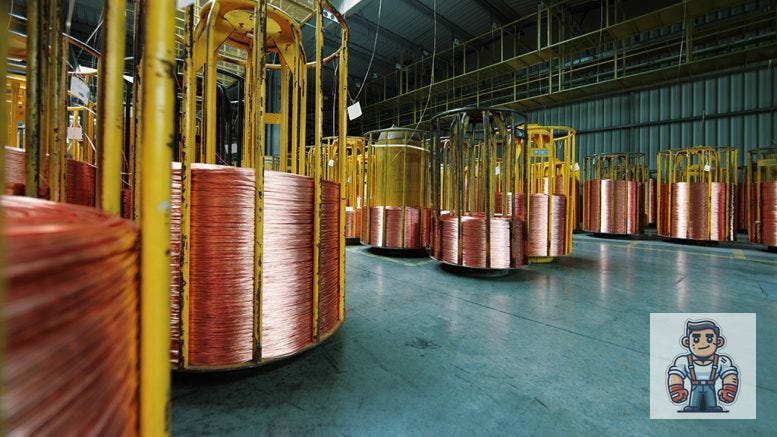The Ripple Effect No One Saw Coming
How Germany's green energy shift spells trouble for U.S. defense
“One of the great mistakes is to judge policies and programs by their intentions rather than their results.” — Milton Friedman
In 1958, Mao Zedong declared war on sparrows. This was part of his Great Leap Forward—a campaign to transform the country from an agrarian society into an industrialized one. Mao blamed the sparrows for consuming grain seeds and reducing crop yields. To eradicate the birds, he mobilized millions of citizens. They used any means necessary to get rid of the sparrows—from destroying nests to driving them to exhaustion.
But sparrows didn’t just eat grain. They also fed on insects, including locusts. The mass extermination of sparrows allowed locust swarms decimate crops far more severely than the sparrows ever could. It contributed to one of the worst famines in human history, claiming tens of millions of lives.
The Danger of Ideology-Driven Policies
Germany’s green energy transition bears some resemblance to Mao’s Great Leap Forward. That’s an exaggeration, of course. But both are ideology-driven policies that disregard practical realities. And both result in unintended consequences that undermine their own goals.
Germany’s goal is to reach net-zero by any means necessary. To achieve this, it keeps expanding renewable generation capacity at a record pace while shutting down perfectly functional nuclear reactors. This effort is financed by subsidies that could rise to nearly €23 billion by 2029. Meanwhile, electricity prices have steadily increased.

One of the industries hit hard by rising energy prices is copper refining and manufacturing. Copper production requires large amounts of electricity to melt and purify the metal, making the German copper industry especially vulnerable.
In 2023, the sector recorded a 10% drop in production compared to the previous year, amounting to 1.3 million tons. The production of copper casting alloys plummeted by 26% to 19,000 tons. The most significant sector—rolled, extruded, and drawn products made from copper and copper alloys—suffered a 22% decline, decreasing to 629,000 tons in 2023.
These trends reflect the broader decline of Germany’s industrial base, as companies across various sectors are being forced to cease production.
An Unexpected Ripple Effect
At first glance, the struggles of Germany’s copper industry might seem like a local issue. “Well, that’s Germany’s problem,” one might say. Copper is a global commodity, and there are plenty of other producers around the world.
But the story doesn’t end there. Germany plays a unique role in global copper markets. What happens to its copper industry doesn’t stay in Germany—it ripples outward in unexpected ways.
While Germany grapples with its copper production challenges, the United States has its own copper story—one that highlights just how critical this metal is to its industries and security. The U.S. is 48% net reliant on imported copper to meet its needs.
In 2022, the United States imported $14.7 billion worth of copper articles, with 6.4% of these imports—nearly $1 billion—coming from Germany. This figure might appear modest compared to imports from Chile, the U.S.’s largest copper supplier. However, there’s a critical difference: German copper doesn’t compete on price.
Chile imports almost four times more copper products into the U.S. imports, driven by cheaper energy and labor. Yet, the U.S. still imports substantial amounts from Germany. Why? Because German copper products meet higher quality and precision standards. For industries where performance and reliability matter more than cost, they are often the first choice.
And that leads us to the core of the issue: the U.S. relies on German copper articles due to factors rooted in compliance, regulation, and strategic necessity.
Supply Chain Threats to U.S. Defense Security
Copper is critical for defense and aerospace systems. Its high conductivity, heat resistance, and strength make it essential for wiring in aircraft, rocket engine parts, and high-pressure valves in military vehicles. Copper alloys are also used in periscopes, tank gears, and aircraft lighting systems.

Replacing a supplier can be challenging for the U.S. Department of Defense because this industry operates in a constrained ecosystem.
Companies supplying the U.S. defense and aerospace sectors must meet strict ITAR (International Traffic in Arms Regulations) standards. These regulations ensures that materials used in defense systems are sourced from trusted suppliers. That involves navigating complex compliance requirements, requiring adherence to complex protocols and strict operational oversight.
Exact data on Germany’s ITAR-compliant copper exports is scarce, but Lisa Reisman, CEO of MetalMiner, emphasized their importance in a recent interview with
. She highlighted that Germany is a trusted ITAR-compliant supplier, known for its high-quality copper products. These materials are vital for technical defense applications.Germany’s reputation as a high-cost, high-quality supplier explains why the U.S. depends on its copper, even when cheaper options are available. Germany’s reduced copper output ripples through critical U.S. supply chains. In fact, losing Germany as a key supplier poses supply risks for the U.S. As Reisman puts it, “not having them as a player is impacting the supply chain in a big way.”
Trading Strategic Advantage for Ideology
Over time, markets tend to resolve supply chain disruptions. Defense contractors rethink their sourcing strategies. Opportunities arise for those who can fill the void. Companies also adapt and relocate to meet changing conditions.
For instance, Germany-based Aurubis recently celebrated the opening of an $800 million recycling plant in Georgia. Similarly, Wieland, another major German copper company, just invested $27 million to expand its production facility in North Carolina.
But all that comes at a huge cost for Germany.
Although Germany’s copper market isn’t enormous, the country is losing its strategic edge as a key supplier to U.S. defense and aerospace industries. This decline is gradually eroding Germany’s influence on the global stage.
Some argue that losing heavy industries is a good thing though. A scientist at the Berlin-based Potsdam Institute for Climate Impact Research, for instance, suggested Europe should “embrace deindustrialization.” An easy claim to make from the comfort of an academic office. But for Germany, deindustrialization isn’t a theoretical exercise—it’s a real threat to jobs, economic strength, and geopolitical influence.
And just like Mao’s sparrow hunt, Germany’s energy transition fails to achieve its goals.
Robert Habeck—the German Green Party’s chancellor candidate and current Minister for Economic Affairs—unwittingly acknowledged this reality during a talk at Columbia University in March 2024.
He told students, “You are not on the path to climate neutrality,” while criticizing the U.S. for its high per capita carbon emissions in colorful language: “Solve the fucking problems“.
He’s convinced the U.S.’ climate standards are lower than Germany’s. But if that’s the case, shouldn’t he focus on preventing copper manufacturers from relocating their operations to the U.S.? Perhaps, though, the real issue isn’t about solving problems at all.
As H.L. Mencken said, “The urge to save humanity is almost always a false front for the urge to rule.”








Good piece. And not just copper, either. Lots of other high-end products in metals, chemicals, plastics that are being affected - industries leaving Germany over energy stupidity. Other countries on similar paths, too.
Great article.
It's sad to see a great country like Germany on a self-destructive path. I think, as you mentioned, some German industries have and will relocate to the US, helping the U.S. to re-industrialize, as other U.S. industries had moved to China and won't come back.
While that may isolate some German companies that can afford to move, it will hurt others and, most importantly, the German people who will lose many good-paying jobs.